The TP-Link Deco BE25 (also called as Deco BE5000) is a budget-friendly Wi-Fi 7 mesh Wi-Fi system for general users, and its price is what makes it attractive. The price of $99 (1-Pack), $169.99 (2-Pack), and $208.89 (3-Pack) makes it a cost-effective dual-band Wi-Fi 7 distributed system. With two 2.5Gbps Ethernet ports on each node, it offers good Gig+ performance for the average user, but it doesn’t have the 6GHz band or 320MHz channel bandwidth that’s available on more expensive models.
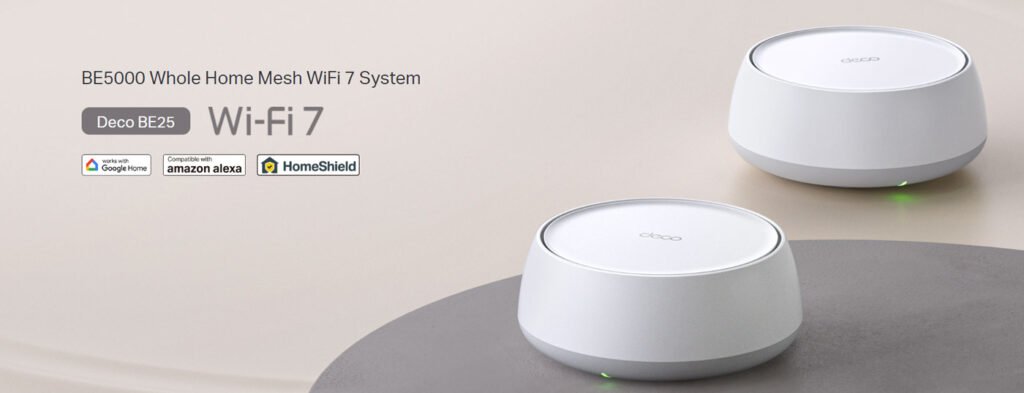
TP-Link Deco BE25 Pros and Cons
TP-Link Deco BE25 Design
The TP-Link Deco BE25 looks identical to the Deco BE23 that we reviewed previously. Departing from Deco’s traditional tall cylindrical design, it adopts a white disc shape measuring 150 × 150 × 62 mm. These units are smaller, allowing them to be less visually distracting in the home and to better blend in with living rooms, bedrooms, or office spaces. Each unit has four internal antennas and is equipped with a 1.1GHz quad-core CPU, 128MB flash storage, and 512MB RAM.
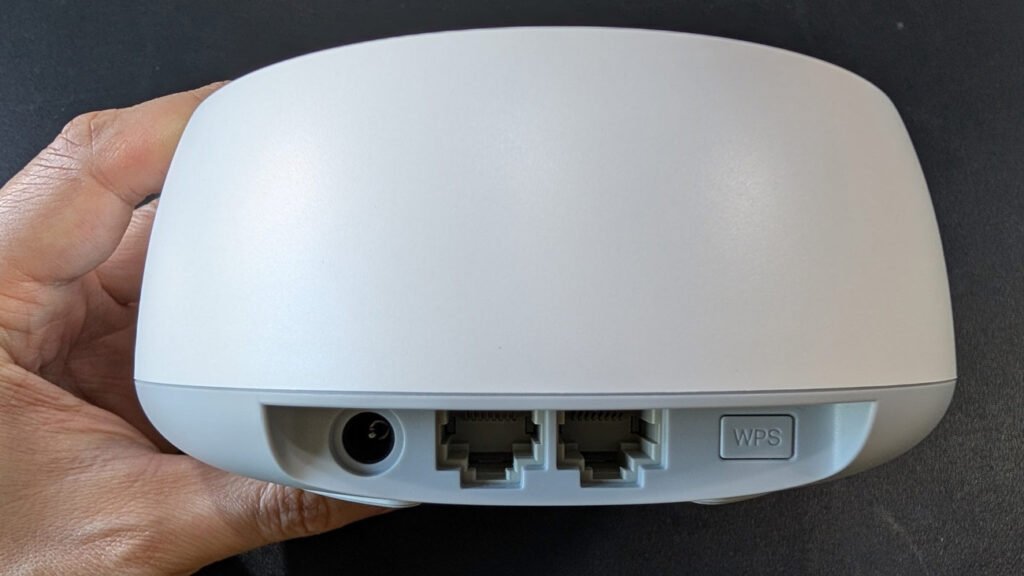
The Deco BE25’s rear panel has two 2.5 GbE ports. One port on the router serves as the WAN interface, while the other functions as the LAN port. Both satellite routers utilise their two 2.5 Gbps ports for connecting wired network devices or establishing a wired network backhaul.The rear also includes a power jack and a rectangular WPS button for quick pairing with compatible wireless gadgets. Like the Deco BE23, this unit has no USB ports. A small LED indicator near the front bottom flashes blue when the system is ready, solid blue during the setup process, blinks green when the system is updating the firmware, and glows green when all connections are made and working properly. A blinking red LED means the node has lost connection to the system, while a solid red LED means there is a system error.
TP-Link Deco BE25 vs Deco BE23
| Model | Deco BE25 | Deco BE23 |
| Wired Backhaul | Yes | |
| Dimensions | 5.91 × 5.91 × 2.44 in (150 × 150 × 62 mm) | |
| Weight | 1.12 lbs (508 gram) | |
| Wi-Fi Bandwith | Dual-band BE5000 | Dual-band BE3600 |
| 1st Band(2.4GHz) | 2×2 BE: Up to 688Mbps (20/40MHz) | |
| 2nd Band(5GHz) | 2×2 BE: Up to 4324Mbps (20/40/80/160/240MHz) | 2×2 BE: Up to 2802Mbps (20/40/80/160MHz) |
| Backward Compatibility | 802.11ax/ac/n/g/a/b | |
| Guest Network | Yes | |
| Mobile App | Deco | |
| USB Port | None | |
| Gigabit Port | None | 2x Auto-Sensing |
| Multi-Gig Port | 2x 2.5Gbps Auto-Sensing | None |
TP-Link Deco BE25 Feature
- 5 Gbps Dual-Band WiFi – 4324 Mbps (5 GHz) + 688 Mbps (2.4 GHz).
- 2.5 Gbps Wired Connections - 2× 2.5 Gbps ports provide ultimate flexibility and enhanced throughput.
- Wireless and Wired Backhaul Combined – Connect a wireless and wired backhaul at the same time with each unit to maximize throughput and minimize latency.
- Multi-Link Operation (MLO) – Send and receive data on multiple bands and channels at the same time to increase throughput, reduce latency, and enhance reliability.
- Seamless AI-Driven Roaming – Creates a single network with AI-Roaming included, delivering the best Wi-Fi solution for your home.
- TP-Link HomeShield – Delivers all-around network security, powerful parental controls, and real-time IoT protection.
- Universal Compatibility – Backward compatible with all WiFi generations and works with any internet service provider (ISP) and modem.
TP-Link Deco BE25 Specifications
| Brand | TP-Link |
| Model Name | Deco BE25(3-Pack) |
| Special Feature | Alexa Compatible, Guest Mode, Internet Security, Parental Control, Remote Access |
| Frequency Band Class | Dual-Band |
| Compatible Devices | Gaming Console, Personal Computer, Smart Television, Smartphone, Tablet |
| Standards and Protocols | Wi-Fi 7 IEEE 802.11be/ax/ac/n/a 5 GHz IEEE 802.11be/ax/n/b/g 2.4 GHz |
| WiFi Speeds | BE5000 5 GHz: 4324 Mbps (802.11be) 2.4 GHz: 688 Mbps (802.11be) |
| WiFi Range | Broader Whole Home Coverage |
| Ethernet Ports | 2× 2.5 Gbps |
| Dimensions (W×D×H) | 5.91 × 5.91 × 2.44 in (150 × 150 × 62 mm) |
| Included Components | 1 RJ45 Ethernet cable, 3 Deco BE25 units, 3 Power adapters, Quick Installation Guide |
TP-Link Deco BE25 Performance
The TP-Link Deco BE25 was amazing in my tests. The router node hit 1,959Mbps in the close-range test and 628Mbps at 30 feet. For comparison, the dual-band MSI Roamii BE Lite router managed 937Mbps at close range and 524 Mbps at 30 feet. Using the 6GHz band, the Deco BE63 achieved 2,288Mbps and 780Mbps respectively.
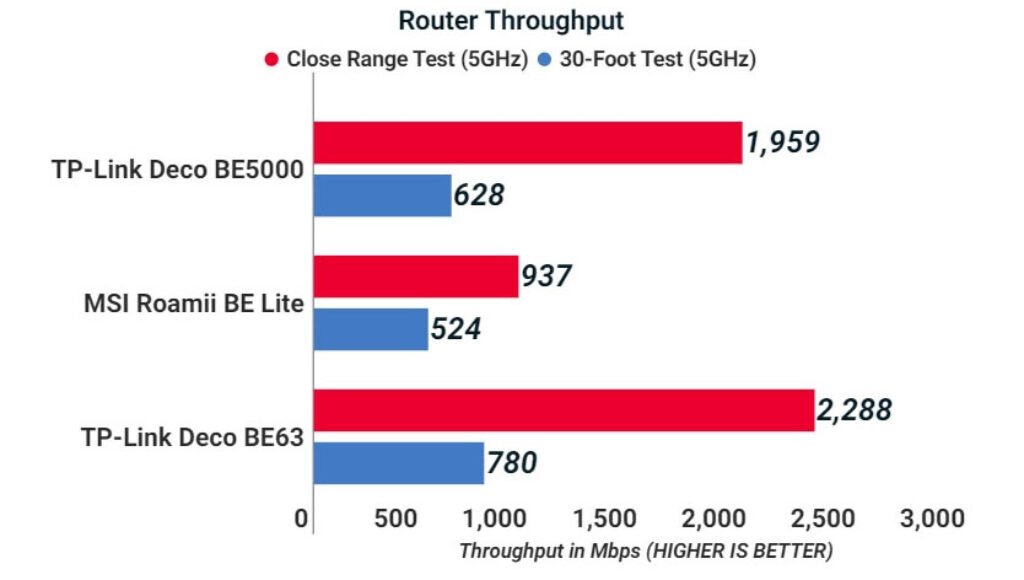
The Deco BE25 satellite node achieved 982Mbps at close range and 630Mbps at 30 feet, beating the Roamii BE Lite node (561Mbps, 441Mbps) but not quite matching the more powerful Deco BE63 (1,688Mbps, 950Mbps).
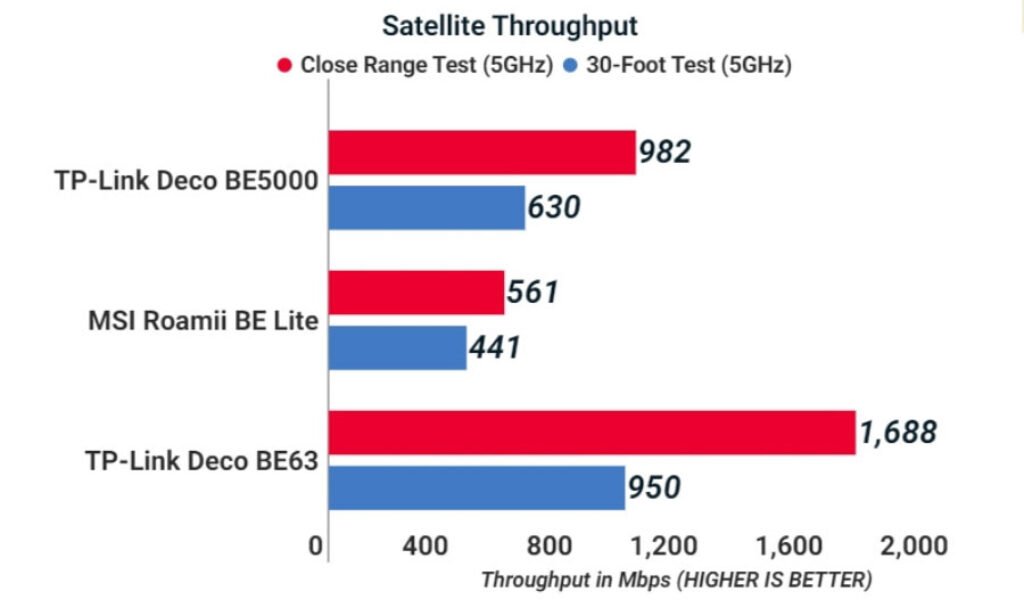
Deco BE25 Wi-Fi coverage: In my testing, a single unit covered 2,600 square feet of indoor space at respectable data rates, while a two-pack covered 4,600 square feet.
TP-LinkDeco BE25 Setup
Like the Deco BE23, the Deco BE25 requires TP-Link’s Deco App for setup and management. I wouldn’t advocate doing these things in a web browser, but the Deco App is simple and makes setup effortless. The application first asks you to scan the QR code on the bottom of the router, which specifies the model. You then connect your phone to the router over WiFi (the Deco BE5000 shows up as an open network). Once connected, the setup process configures your internet connection, prompts you to enter a new SSID/password, and completes the network initialisation. After the router setup is done, the installer will ask you to turn on the two satellites to complete the network formation. In our test setup, after a few minutes of synchronisation, both satellites formed the mesh network and became visible within the Deco application.
It should be noted that TP-Link has made every effort to render the configuration process as straightforward as possible for novices, hence only providing application-based settings. This also applies to certain available network configurations. For instance, I could not locate a method to disable Smart Connect; consequently, the 2.4 GHz and 5 GHz channels are merged under a single SSID. To conduct separate wireless band testing, I instead isolated the bands on the wireless client card within the network adapter properties of Windows 11. You may also connect satellites to the router via a wired backhaul using the 2.5 Gbps LAN port. TP-Link even permits leveraging the Wi-Fi 7 standard’s MLO capability, combining the 2.4 GHz and 5 GHz bands with the wired backhaul to enhance overall backhaul performance.
TP-Link Deco BE25 Firmware
You can manage the Deco BE25 using the Deco mobile application. The app opens the “Network” screen, featuring a button to test your internet upload and download speeds via Speedtest.net, and another button leading to a screen for configuring Wi-Fi settings. Below these buttons is a gauge displaying your current upload and download speeds, followed by a network map showing the router and nodes. Tapping any node reveals the clients currently connected to it. Tapping a client device displays its MAC address and IP address, along with whether it’s assigned to a family member. Here, you can assign bandwidth priority or block it from communicating with other devices on the network.
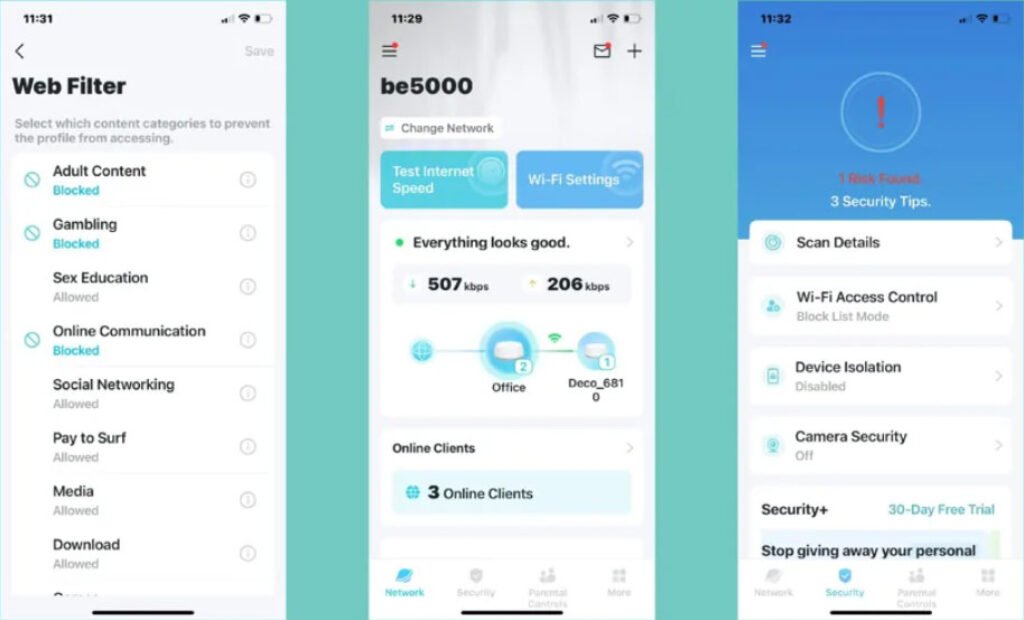
Buttons named ‘Network’, “Security”, ‘Parental Controls’, and ‘More’ can be found at the bottom of the Deco App screen. No matter where you are in the app, the Network button will take you back to the Network screen; the Security button will bring you to a new screen where you can scan for security threats on your network, see scan results, block clients from your network, quarantine devices
The Deco BE25 includes TP-Link’s HomeShield software, which offers a free tier of basic parental controls and network security features. In the basic package, parents can create user profiles and apply age-based web filters, pause internet access, and block websites. The premium subscription for parental controls service costs $2. $2.99 per month or $17.99 per year, provides access to Safe Search, YouTube Restricted Mode, flexible bedtimes, time limits, time rewards, and Insights


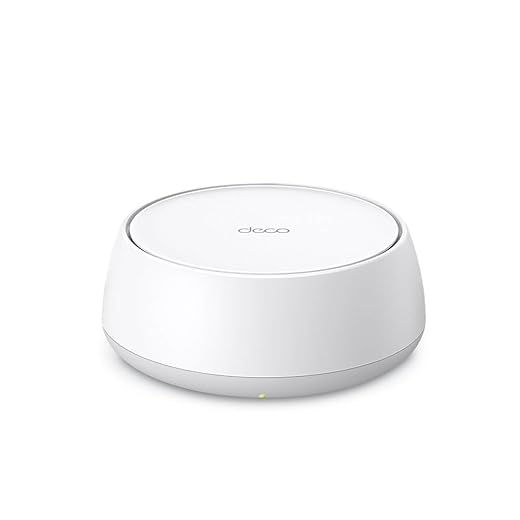
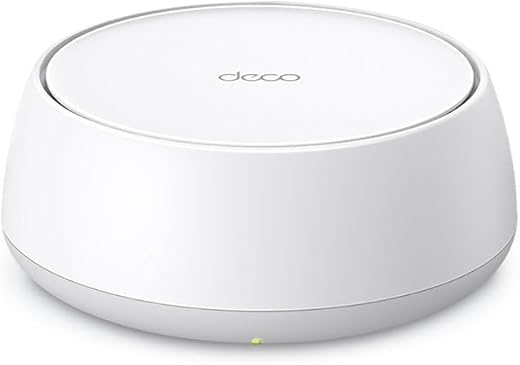
 Amazon.com
Amazon.com 



